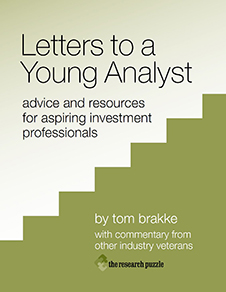
- Friday, November 21st, 2008
- i hired a guru
-
Recapping your life’s work for someone else is never easy to do in a concise fashion. And, if it happens to be in response to a question during a job interview or at a class reunion, there may be an inclination to overstate your accomplishments a bit. One lighthearted way that I attempt to answer the inquiry is with the line, “I hired a guru and taught a swami.”
Then one day, I happened to hear Garrison KeillorKeillor, of course, is from just up the road in Lake Wobegon, where “all the women are strong, all the men are good looking, and all the children are above average.” on the radio, in the guise of Guy Noir, being taught the difference: “A swami is a holy man. He is a visionary. A guru is a consultant.”A Prairie Home Companion | This is the original script, in case you think I am just making it up.
While my eight-word résumé is accurate (for I had, in fact, hired someone named Guru and one of my students was named Swami), with Keillor’s definitions in hand, we can better explore our topic — the predisposition of investors to seek out gurus of the investment world for answers.
The gurus become gurus because they have track records that we envy and someone told us about them and how they worked their magic. The Money Masters by John Train was a notable book that did just that on the eve of the late, great bull market. Published in 1980, the book featured nine investors of different styles who had distinguished themselves, starting with a fellow in Omaha (whose guru status has come under attack in the last few days, but who has done pretty well since 1980).
A cottage industry has developed to feed our interest in the gurus, with other books being publishedLynx Investment Advisory | One entitled Investment Gurus, written in 1997 by Peter Tanous, the president of Lynx, is on my bookshelf. Inside it, I found an inscription from my Goldman Sachs salesman, urging me on to greatness., and websites and research firms like GuruFocus and Validea making a business out of implementing the strategies of the success stories. So, does it work?
Mostly, sometimes, who knows? There is no doubt that analyzing in detail the work of successful investors can aid in learning about how the market functions and how different strategies can be used effectively. As always, the analysis of specific performance records is fraught with difficulties, not the least of which is that the documented track records may hide performance patterns that are suitable for one investor and not another. Gurus that run portfolios — or portfolios that are run using specific guru principles — at least provide documented performance to chew on; much harder to pin down is the “performance” of would-be gurus that make predictions and pronouncements. CXO Advisory GroupCXO Advisory Group | For those looking for objective statistical analysis of a variety of market issues, this is a great site. As for this linked page of “guru grades,” make sure to read the whole thing, including the explanations and caveats, to get a sense of how hard it is to evaluate these prognasticators. is one firm that takes on the challenge of doing so.
My concerns with the whole guru thing are chiefly two: The inclination to apply the approach of others in a formulaic fashion and the tendency for investors to get into worship mode, where they ascribe otherworldly powers to the objects of their affections and miss great opportunities to rebalance their dollars and their devotions.the research puzzle | For more religious imagery, you might check out this previous post called “gazing upon the icons.” Neither serves investors well.
Remember, a guru is a consultant. Even the observations or actions of a successful one should not be accepted blindly; judgment is required as to when to adopt, when to adapt, and when to ignore his advice. And don’t make him into the swami he is not.
